Today there are more than 100 million Amazon Prime members worldwide. This American electronic commerce and cloud computing company was started in 1994 by Jeff Bezos in Seattle, Washington. Although it began as an online bookstore, it now sells video games, electronics, apparel, furniture, food, toys, jewelry, and more. Users can stream Oscar-winning movies and music, as well as listen to audio books. Amazon’s low prices and fast delivery are raising the bar for competitors and keeping customers happy. This past month, Amazon reached $1 trillion in value, falling second only to Apple. But, should the changing economy be subject to new rules? Lina Khan thinks so, and she’s shaking up the system.
Movement Toward Change
Wondering who Lina Khan is? Born in London, Khan emigrated to the United States at age 11. She studied law at Yale and worked as an analyst at New America, where she researched consolidation across sectors. Her writing has appeared in the Yale Law Journal and Harvard Law & Policy Review. She was recently covered in a New York Times article, which discusses a paper she wrote as a law student that got her noticed and opened up a discussion for change.
Khan’s article Amazon’s Antitrust Paradox, published in the Yale Law Journal, discusses how current antitrust laws assess competition based on short-term interests of consumers, rather than the health of the market as a whole. She states, “Amazon has marched toward monopoly by singing the tune of contemporary antitrust.” Khan argues that a new assessment should be put in place, especially for online platforms, which would examine the competitive process itself. The focus would be on the business and the structural role it plays in the market. Khan believes it’s important to preserve the competitive process and market structure, rather than the consumer welfare framework that is currently in place.
This article has opened doors for Khan and even landed her with her own critics. She was asked to come in as a temporary advisor in July by the Federal Trade Commission in the midst of questions surrounding privacy, data, and competition. The FTC is holding a hearing this fall to determine whether there should be a change in rules to correspond with the changing economy.
HeinOnline Tips & Searching Tricks
Interested in Lina Khan and her writing? Check out her Author Profile Page in HeinOnline! Simply enter her name in the Author field in the Advanced Search option underneath the search bar.

Within search results, click on Khan’s name hyperlinked in blue to be directed to her Author Profile Page.
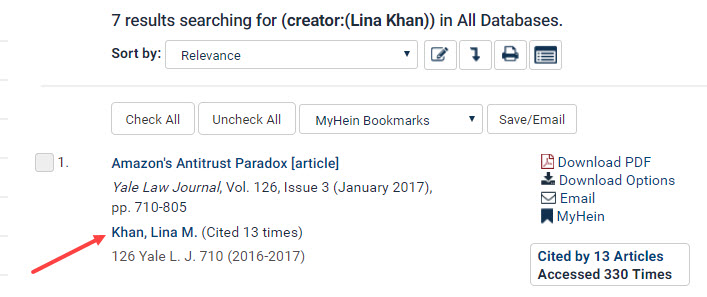
From Khan’s Author Profile Page, users can view her ScholarCheck metrics, as well as a list of all her published articles in HeinOnline. Click on the Twitter link to be directed to Khan’s Twitter.
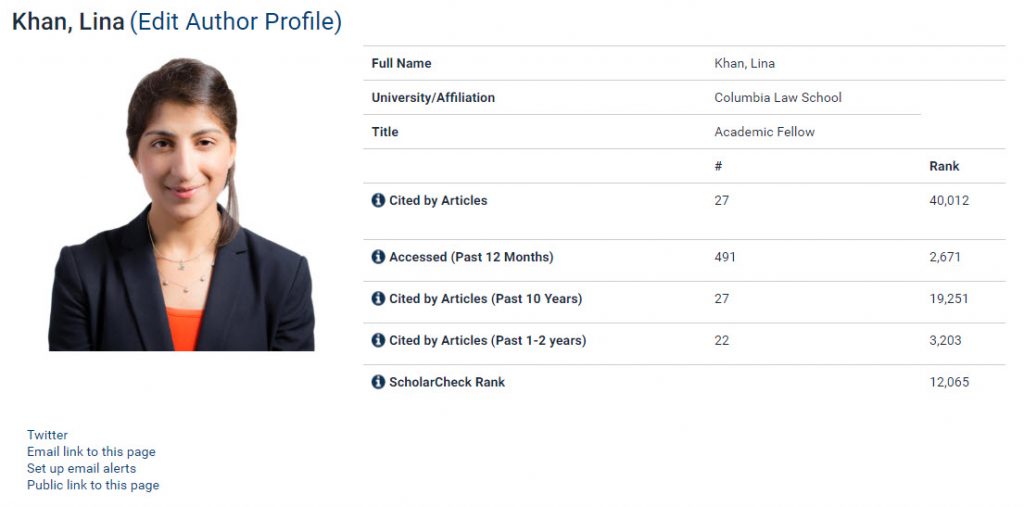
Additionally, users can set up email alerts to be notified of the following:
- When new material for this author is added to HeinOnline
- When new articles in HeinOnline cite this author’s articles
- When articles are accessed on HeinOnline each month
- When similar articles are published on this author’s works

Now, let’s take a look at how to research this topic in HeinOnline. Start by using the Full Text tab from the Welcome Page to search across all databases. Enter the phrase “monopoly power” and click the search button.

From the results page, refine the search to include the date range of 2016 to date and choose Trade regulation under the Topic facet.
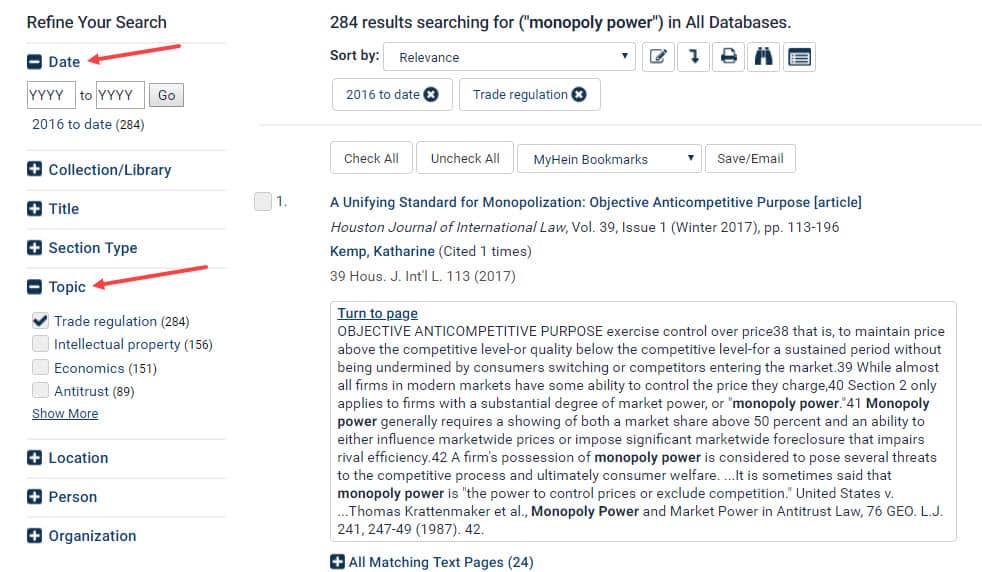
Relevant articles include:
- Does the Federal Trade Commission’s Section 5 Statement Impose Limits on the Commission’s Unfair Methods of Competition Authority?
- Antitrust Law is Not That Complicated
- Economic Evidence in Antitrust Cases and Enforcement
- On the Relevance of Market Power
Next, let’s search for titles in the Law Journal Library which contain the phrase. Using the Full Text tab, enter title: ”monopoly power” and click the search button.

From the results page, choose Number of Times Cited by Articles from the Sort by option.
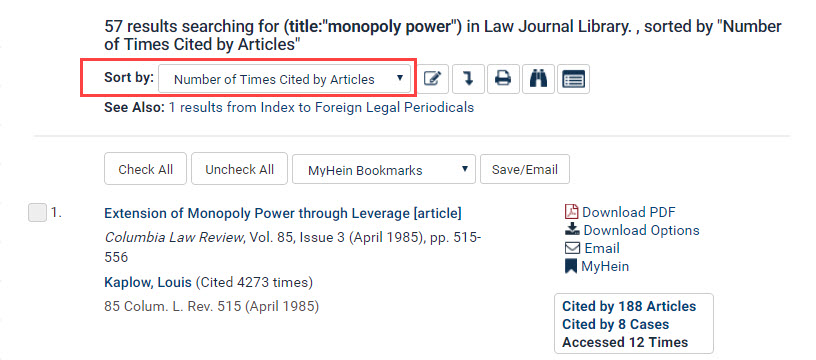
Notice the first article listed, Extension of Monopoly Power Through Leverage has been cited by 188 articles, cited by 8 cases and accessed 12 times in a rolling 12-month period by other HeinOnline users. Hein’s ScholarCheck feature allows users to click on the hyperlinks to view these articles and cases.

Now, switch the Sort by option to Number of Times Accessed (Past 12 Months) to see the most accessed articles regarding this search topic.
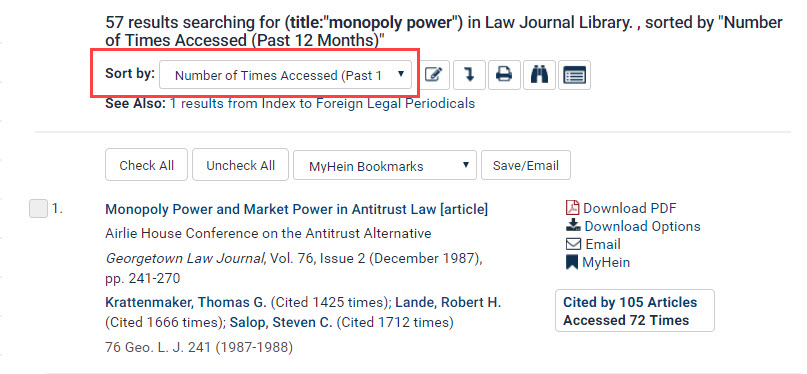
Take a look at the first article, Monopoly Power and Market Power in Antitrust Law, which has been accessed 72 times in a rolling 12-month period by other HeinOnline users. To view similar articles, click the More Like This button.
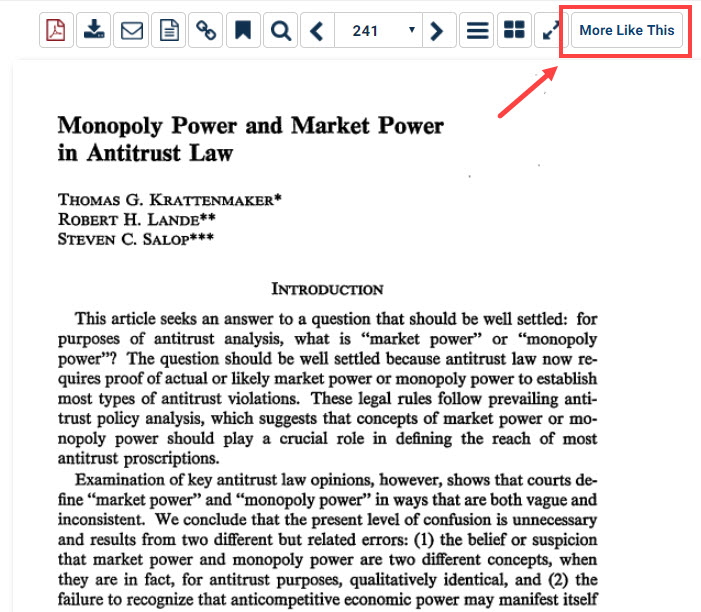
This tool uses a program which pulls out “interesting words,” as determined by an algorithm, from the article being viewed. After clicking the More Like This button, users are provided with a list of similar articles, based on the interesting words.
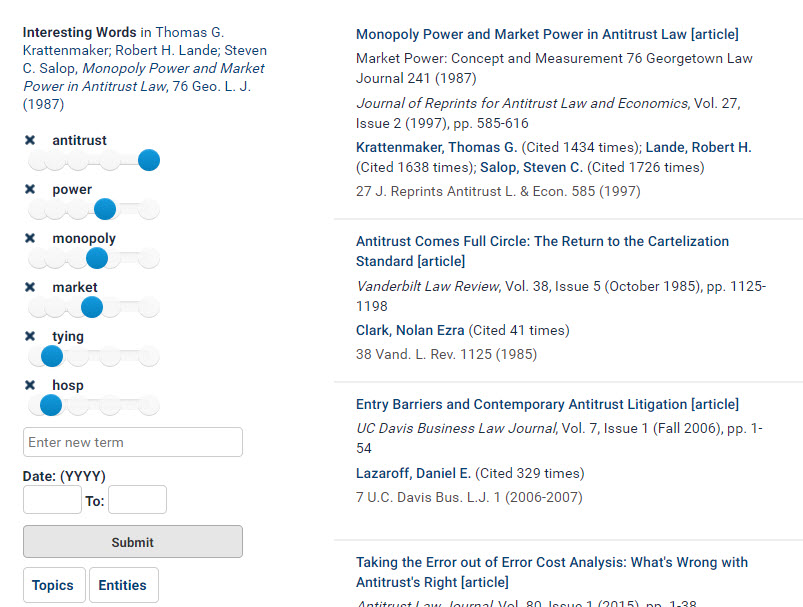
For help searching or navigating HeinOnline, contact our dedicated support team at (800) 277-6995, email us, or chat with us!
Stay in the know with HeinOnline and connect with us on Facebook, Twitter, Instagram and YouTube!



